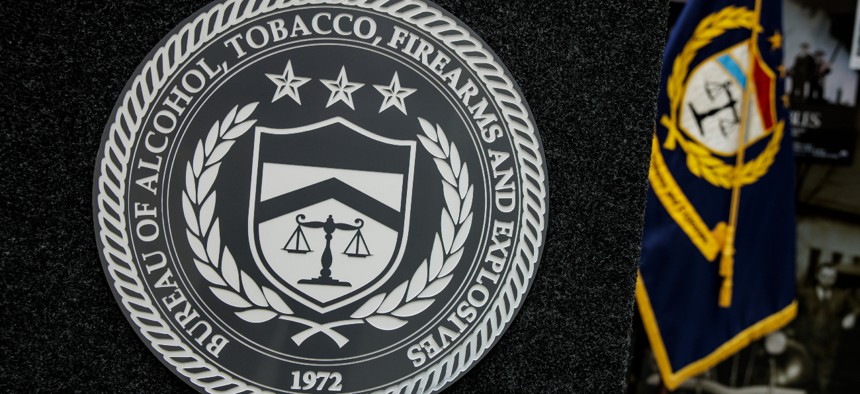
In 2013, the Office of Personnel Management gave ATF a special hiring authority called Schedule B to recruit and hire special agents. Samuel Corum/Getty Images
ATF Should Shore Up Its Policies on Hiring Family and Friends, Says Watchdog
Recruiting family and friends as special agents isn’t an issue in and of itself, but more can be done for the agency’s policies and training, the Justice Department inspector general said.
The federal firearms agency should do more to avoid ethical issues with the hiring of special agents, a watchdog recently reported.
Michael Horowitz, Justice Department inspector general, sent a four-page memo last week to Steve Dettelbach, director of the Bureau of Alcohol, Tobacco, Firearms and Explosives, regarding concerns with its hiring practices of special agents who investigate crimes related to guns, explosives, alcohol and tobacco throughout the country.
“The OIG has discovered that, while it is common for ATF employees to recruit from among friends and family for special agent positions, ATF does not provide employees any guidance or training concerning avoiding potential ethics or merit-based hiring issues that can arise at the recruitment stage,” wrote Horowitz on Dec. 13.
The four pathways for working at the ATF are special agent; industry operations investigator; forensics and STEM; and professional and technical. As of August 2022, ATF had 5,093 employees, 2,631 of which were special agents (51.7%).
In 2013, the Office of Personnel Management gave ATF a special hiring authority called Schedule B to recruit and hire special agents. This allows agencies to avoid the competitive examining process to fill roles “for which it is impracticable to hold open competition or to apply usual competitive examining procedures,” as the law dictates. Agencies must also ensure they don’t violate any prohibited personnel practices or ethics standards.
ATF encourages employees to serve as “informal recruiters to ensure a qualified and diverse applicant pool” as part of its targeted recruitment efforts and the IG learned that oftentimes employees recruit among friends and family, which is not improper in and of itself, said the watchdog. Also, there are other ways in which prospective ATF employees are recruited and the checks put in place to avoid nepotism. However, even if the hiring decisions aren’t the result of nepotism, other issues can arise, said the watchdog.
“It is the OIG’s understanding that ATF does not have a written policy governing the recruitment of friends and family, nor does it provide employees engaged in recruiting activities with any specific process to follow when recruiting a friend or family member,” wrote Horowitz. “It is also the OIG’s understanding that, while ATF trains its employees about avoiding nepotism issues at the interview and selection stage, ATF does not provide any training or guidance to employees regarding potential ethical, appearance, or merit-based hiring issues that can arise during the recruitment stage.”
Therefore, the IG recommended that ATF review its Schedule B policies and procedures and add on a policy that specifically touches on the recruitment of friends and family, which will ensure that the agency follows the merit-based hiring principles and ethics obligations.
A footnote in the memo notes that the IG gave a draft of the memo to ATF for review and it did not give any comments or proposed changes. Therefore, the IG deems the recommendation to be resolved and asked the agency to give an update within 90 days on how it's addressing the recommendation.
“ATF has received and reviewed the inspector general’s recommendations and will be implementing appropriate measures to address those recommendations,” Erik Longnecker, ATF deputy chief for public affairs, told Government Executive on Monday.
Government Executive also asked the DOJ IG office if there was a specific situation(s) that led to the issuance of this memo and the office did not have any information to share beyond what was in the memo.







